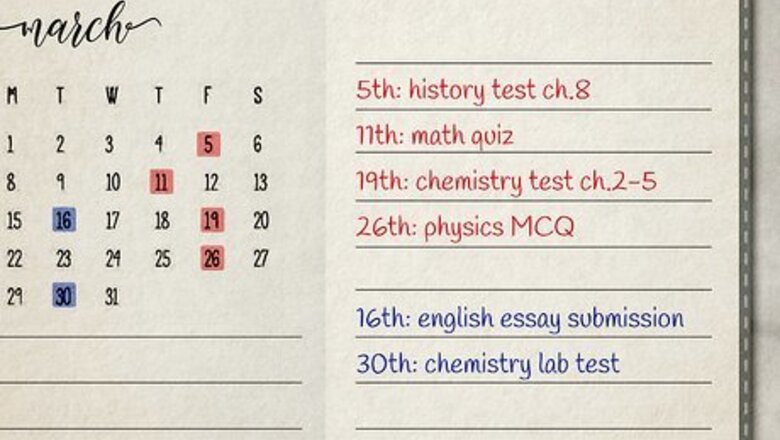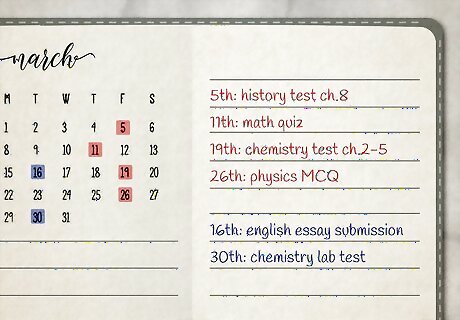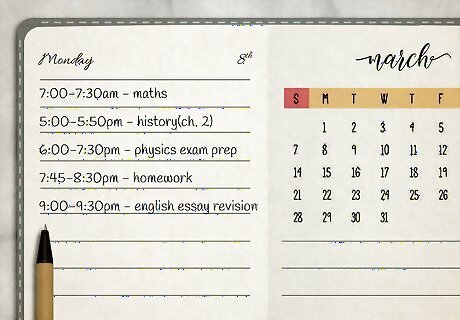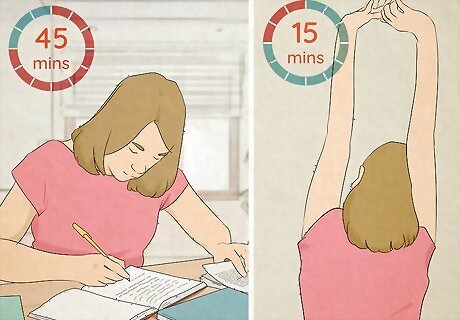
views
Get a planner.

A planner makes it easy to track homework, assignments, and due dates. Whether it's a day planner you carry in your backpack, a calendar on your wall at home, a to-do list, it can help you stay organized. At the beginning of the term, when you get your planner, note down every test, quiz, and assignment due date. Do this for each class. Every day when you get home from school, check your calendar and see what needs to be done before tomorrow, as well as what's on the horizon for the next few days. Check off what you have already done so you don’t get confused.
Participate in class.

Raise your hand to ask and answer questions. Some classes even grade you on participation, so it’s important to make your voice heard. If you ever feel stuck or confused, raise your hand and ask the teacher for clarification. If you have trouble paying attention in class, try to sit near the front so it’s harder to get distracted. If you’re an auditory learner, try recording the lectures so you can listen to them later on. Your teacher will really appreciate it if you participate, especially if you’re one of the only people doing so. And if you get on their good side, they’re more likely to be lenient on you during the grading process.
Take good notes.

Write down the most relevant information during class. You don’t have to copy everything the teacher says (you probably won’t have time), but make sure you write down key concepts. Anything your teacher writes on the board or projects to the class is probably worth writing down. To write notes quickly, try using shorthand instead of full sentences. For instance, if you’re in math class, shorten “geometry” to “geo” and “algebra” into “alg.” Understand the 80/20 rule of studying: 80% of the test questions surround 20% of the most important concepts. If you are crammed for time figure out these core concepts by looking at past tests and study these first.
Ask your teacher for help.

Your teacher is there to answer any questions you might have. It doesn't have to be a complex question; your teacher is always happy to help you. Ask after class, during office hours, or in an e-mail for assistance. Often things we're told one-on-one stick with us more than things we're just being lectured about. If you’re a visual learner, try asking the teacher for handouts or study guides you can use. If you’re a hands-on learner, your teacher might have suggestions for you on how you can translate your work into good study material.
Get a tutor if you need to.

You might struggle with some subjects, and that’s okay. If the subject is super hard and you just can't understand it, get a tutor to help you. Sometimes a tutor is even more helpful than getting a one-on-one with a teacher because they are closer to your age and can explain things to you in a manner that you can understand better. Your school might also have a tutoring center where you can go and get help from different departments. EXPERT TIP Joseph Meyer Joseph Meyer Math Teacher Joseph Meyer is a High School Math Teacher based in Pittsburgh, Pennsylvania. He is an educator at City Charter High School, where he has been teaching for over 7 years. Joseph is also the founder of Sandbox Math, an online learning community dedicated to helping students succeed in Algebra. His site is set apart by its focus on fostering genuine comprehension through step-by-step understanding (instead of just getting the correct final answer), enabling learners to identify and overcome misunderstandings and confidently take on any test they face. He received his MA in Physics from Case Western Reserve University and his BA in Physics from Baldwin Wallace University. Joseph Meyer Joseph Meyer Math Teacher Review basic concepts before diving into advanced topics. Identifying the gaps in your knowledge helps you avoid difficulties later on. Take an assessment or get your teacher's advice on where you can improve. Practice targeted exercises to build a strong foundation so you can confidently tackle new lessons.
Make a study schedule.

Try to stick to the schedule as much as possible. Map out your week to see when your studying can and should get done. That way you know just how much time you can devote to each class and when it makes the most sense to study for each one. It’s up to you how often you need to study, but be sure to make more time for the tougher classes. Use your common sense when it comes to allotting time to specific classes. For example, Badminton needs a lot less time than the Principles of Celestial Mechanics.
Form a study group.

Studying with your friends can help you understand tough concepts. Bouncing ideas off each other and combining knowledge is a great way to study for tests and do homework. Just make sure you don't distract each other or spend your whole time chatting with each other about the day! This takes the information off the page and makes it fun and memorable. When you have to explain something to a friend, you think about it in a different way that can make it easier to understand.
Use memory tricks for memorization.

Mnemonic devices can help you remember tough information. Odds are, you probably know Roy G. Biv for the order of the colors of the rainbow or "My very exhausted mother just slept until noon." for the order of the planets. Why is that? They're effective mnemonic devices that stick in your mind! Associations work, too. If you're trying to remember that India used to be a British colony, picture the queen jogging laps around the Taj Mahal. When the test comes, you may not remember what you actually should remember, but you'll remember enough to jog your memory!
Study for 10 to 20 minutes every day instead of cramming.

Cramming isn’t the most effective way to retain information. Although it’s inevitable sometimes, the best way to study is to do a little bit each day up until the test. Try to start studying a full week before you need to use the information. Try not to pull all-nighters before a test, either. If you’re tired and groggy, you won’t be able to think clearly and effectively.
Try practice tests.

They’ll help you prepare for the real thing. Look up a practice test online in your subject of choice and try to answer it as best you can. Check your answers, then go back over anything that you missed. There are tons of practice tests for big exams like the SAT or the ACT online. If you have trouble finding a practice test, ask your teacher to give you one.
Take 15-minute breaks every 45 minutes.

Taking breaks gives your brain a chance to relax. When you’re studying or doing homework, be sure to give yourself time to pause. You can walk around your house, get a snack, or go take a quick jaunt around the neighborhood. Make sure you do something on your break that’s actually relaxing. It will help you feel rested and ready to tackle the rest of your work.
Eat a good, healthy breakfast every day.

Studies show that breakfast can really put your best foot forward. Before you head to class in the morning, try to eat a little something to fill up your stomach and give you fuel until lunch time. If you really aren’t hungry, grab a granola bar or a yogurt so you can eat it later on. Pick a breakfast that’s both filling and nutritious. Go for oatmeal, toast, bagels, eggs, fresh fruit, yogurt, or granola to fuel your mind and your body.



















Comments
0 comment